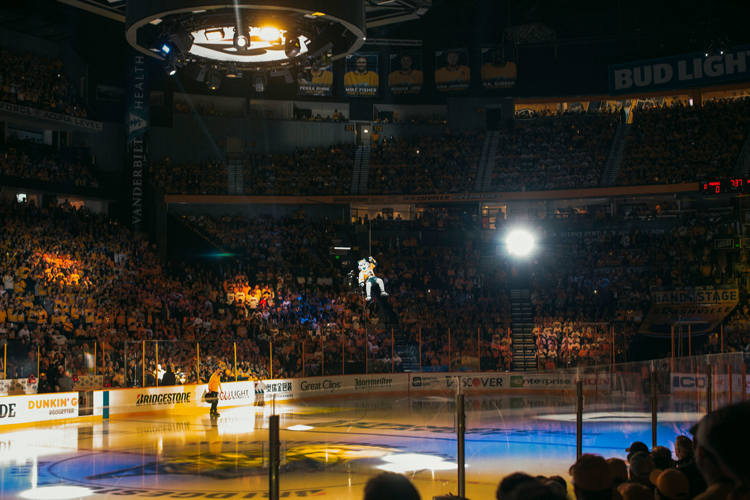
Vodka Yonic features a rotating cast of women and nonbinary writers from around the world sharing stories that are alternately humorous, sobering, intellectual, erotic, religious or painfully personal. You never know what you’ll find in this column, but we hope this potent mix of stories encourages conversation.
I wouldn’t go so far as to say that hockey was my life, but at one point not so long ago, it was definitely a major organ. Not a lung, but maybe the gallbladder. Or a kidney. Something a person can theoretically live without, but probably wouldn’t want to if given the choice.
Over the summer, though, that feeling started to shift. Everything started to shift. Catastrophically. You know. You were there, too. First there was the global pandemic. Then came the civil unrest as millions of Americans woke up to the fact that our country was indeed built on a racist system that favors the rich and the white over everyone else. Later came the chaotic election, the deadly insurgence, the second impeachment, the historic inauguration. With every truth-is-stranger-than-fiction moment, hockey faded further and further from my mind.
When the sport did manage to push its way through the flurry of headlines, it was rarely good news. The National Hockey League — the whitest major professional sports league in America, with the whitest fan base, according to FiveThirtyEight — constantly tripped over itself as it tried to keep up with the heated discussions about racial inequality.
Attempts were made. On Aug. 1, during the NHL’s first playoff game of the 2020 season, Minnesota Wild’s Matt Dumba, who is Filipino, was the first NHL player to kneel during the national anthem. It was a remarkable moment, especially considering that the Wild’s owner, and Dumba’s boss, is Craig Leipold — a man who has given hundreds of thousands of dollars to Republican candidates who have condemned the Black Lives Matter movement.
The next day several players for the Nashville Predators — including captain Roman Josi — arrived for their first playoff game at Edmonton, Alberta, arena Rogers Place wearing Black Lives Matter shirts. I was proud. This was my home team, and until that moment, the Preds had been notoriously mum when it came to commenting on political topics.
Later that month, though — days after Jacob Blake was shot seven times by a Kenosha, Wisc., police officer — the Predators tweeted that the team would “put action into place using the platform we have to fight racial injustice and inequality.” It was originally posted with the #blacklivesmatter hashtag, but minutes later the tweet was deleted and reposted without the hashtag or any mention of Black Lives Matter, or Black lives at all. It was embarrassing, and it was one of many missteps over the years.
Being a Preds fan, a hockey fan, a fan in general, has more often than not become an exhausting exercise in self-reflection. In 2014, when the Nashville Predators signed Mike Ribeiro to a one-year contract, general manager David Poile already knew Ribeiro had been accused of sexual assault. Ribeiro’s former nanny said the hockey player raped her in 2012, when she was 18 years old. The team signed him anyway, and they stood by him even after graphic details of the alleged assault were released in a civil lawsuit filed against both Ribeiro and his wife in June 2015. Less than a month after the court filing, on July 1, 2015, the Preds signed Ribeiro to a two-year, $7 million contract extension.
The team also stood by forward Austin Watson after he was arrested and convicted of domestic assault in 2018. Watson was admitted into the NHL’s substance abuse and behavioral health program. Months later, the Preds re-signed him to a three-year, $4.5 million contract. In the fall, the Preds signed a new forward, Nick Cousins, to a two-year, $3 million contract. Cousins was 18 when he and two of his Ontario Hockey League teammates were arrested and charged with sexual assault in 2012. A woman told police she met the three men at a bar, and that after the group left to go to a nearby house, they raped her. The charges were ultimately dropped due to there being “no reasonable prospect of conviction.”
In my years as a Preds fan, I’ve pitted all of this against my desire to get excited for a bunch of millionaires skating on ice. And, well, I’m tired. I’m tired of wondering if the man I’m cheering for assaulted a woman. I’m tired of seeing teams participate in pandering initiatives without first publicly addressing how they’ve benefited from and contributed to the white supremacist system they claim to be against. Most of all, I’m tired of wondering what secrets are being kept in an effort to protect multimillion-dollar franchises from criticism and backlash.
What do you do when something you love, something that was once a fun distraction from all of society’s soul-crushing flaws, has become a contributing factor to those very issues?
There is a small glimmer of hope on the horizon. In September 2019, the NHL’s newest team, the Seattle Kraken, hired Hockey Hall of Fame member Cammi Granato, making her the first female pro scout in the NHL. In August, the team hired Everett Fitzhugh as their radio play-by-play announcer, making Fitzhugh the NHL’s first Black staffer in the role. History will be made when the Kraken hit the ice this fall. Nashville’s attempting to grow, too — this year the Predators introduced the GUIDER Initiative, which aims to “diminish the prevalence of social injustice in any form” by incorporating “Growth, Understanding, Inclusion, Diversity, Equality and Representation” into the organization.
Even before the pandemic hit, I questioned whether or not I was going to renew my season tickets. Now I’m sure I won’t. I’ll continue to follow the team. I’ll still watch the games, cheer when Filip Forsberg scores the game-winning goal in overtime, and hope for Pekka Rinne to get a Stanley Cup before he retires (though it doesn’t look good). And I’ll continue to complain about the power play as a co-host of It’s All Your Fault, a weekly Nashville Predators podcast produced by the Nashville Post and the Nashville Scene.
I still like hockey. There’s a long way to go before I’ll love it again. And maybe it’s OK if I never do.
Correction: A previous version of this story stated that Matt Dumba is Black. He is of Filipino descent. We apologize for the error.




